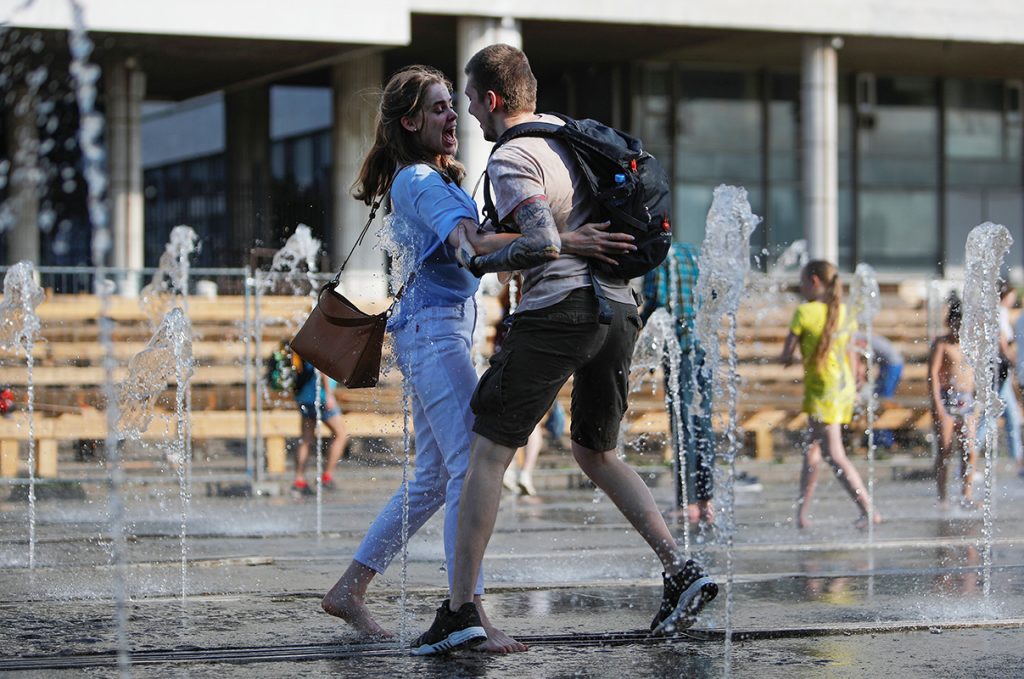
Russian clergy and lay Catholics were “caught by surprise” by the pope’s remarks in a video call Aug. 25 to a youth gathering in St. Petersburg praising the country’s past empire and urging young people to “never give up this heritage.”
Ukrainians were even more surprised as the papal remarks caused pain and concern in the country fighting the Russian invasion.
Major Archbishop Sviatoslav Shevchuk of Kyiv-Halych said that he learned the words “attributed” to the Holy Father “with great pain.”
“We assume that His Holiness’s words were spoken spontaneously, without the pretension of giving a historical assessment, let alone the intention of supporting Russia’s imperialist ambitions,” Archbishop Shevchuk wrote in an Aug. 28 statement.
“The words about ‘the great Russia of Peter I, Catherine II, of that empire – great and enlightened, a country of great culture and great humanity’ refer to the worst example of extreme Russian imperialism and nationalism,” the leader of the Ukrainian Catholic Church said.
“We fear that those words are understood by some as an encouragement of precisely this nationalism and imperialism, which is the real cause of the war in Ukraine. War that every day brings the death and destruction of our people,” he stressed.
Archbishop Shevchuk said that in order to “prevent the Holy Father’s words and intentions from being manipulated,” they “await an explanation of the situation from the Holy See.”
The next day, the director of the Vatican’s press office, Matteo Bruni, emphasized that the pontiff’s remarks should be “seen in context.”
“The pope intended to encourage young people to preserve and develop the positive things that are in the great Russian cultural and spiritual heritage, and by no means to glorify imperialist logic, and rulers who are mentioned to denote certain historical periods,” Bruni told Rome journalists Aug. 29, a remark seen as an attempt to calm outrage caused by the pontiff’s words, spoken off-the-cuff in Italian at the end of the video call.
The Vatican’s response came after the Kremlin’s spokesman, Dmitry Peskov, speaking Aug. 29, welcomed the pope’s “very gratifying” remarks, adding that they were “in unison with the Russian authorities” and highlighted the pontiff’s knowledge of Russian history, with its “deep roots” and “legacy.”
Jesuit Father Stephan Lipke, secretary-general of the Russian bishops’ conference said that he thought Pope Francis “wanted to show how true humanism means thinking about the past, not superficially leaving it behind, as in Bolshevik times – and thinking about it for yourself, not just repeating what others have said.”
He explained the video call from Pope Francis “was important in creating the feeling that young Catholics here were not alone or isolated,” he said.
Pope Francis caused international controversy with his Aug. 25 closing remarks to the 10th Russian Catholic youth festival, in which the pope called on participants to preserve the legacy of Russia’s “great, educated” empire.
The remarks were not included in an Aug. 26 Vatican News report on the meeting, but carried on Cathmos.Ru, the website of the Catholic Church’s Moscow-based archdiocese.
A statement posted on the website of the Vatican nunciature in Kyiv Aug. 28 said that while “according to some interpretations, Pope Francis might have encouraged young Russian Catholics to draw inspiration from historical Russian figures known for imperialistic and expansionist ideas and actions,” the nunciature “firmly rejects the aforementioned interpretations, as Pope Francis has never endorsed imperialistic notions.”
“On the contrary,” the papal embassy in Kyiv said, “he is a staunch opponent and critic of any form of imperialism or colonialism across all peoples and situations. The words of the Roman Pontiff spoken on Aug. 25 are to be understood in this same context,” the statement said.
The meeting at St. Petersburg’s St. Catherine Basilica was attended by about 400 young Catholics, as well as by the Vatican’s nuncio, Archbishop Giovanni D’Aniello, and Russia’s five Catholic bishops.
Oksana Pimenova, deputy director of St. Thomas Institute in Moscow, addressed the group, which also heard testimonies from Alexander Baranov, a former satanist and Catholic convert, and Varvara Molotilova, a Catholic from Yekaterinburg.
In his video address, the pope revived themes of vocation and belonging from the Catholic Church’s Aug. 1-6 World Youth Day festival in Portugal, and told young Russian Catholics, “The alliance between generations keeps the history and culture of a people alive.”
He added that he hoped young Russians would become “artisans of peace,” amid “so many conflicts and amid so many polarizations,” as well as “sowers of seeds of reconciliation, small seeds that in this winter of war will not sprout in the frozen ground for the time being, but will blossom in a future spring.”
Answering questions, Francis said diplomacy, although “not easy,” could be “very fruitful,” also in regard to “the Ukrainian situation.”
Jonathan Luxmoore writes for OSV News from Oxford, England.









